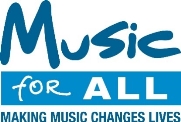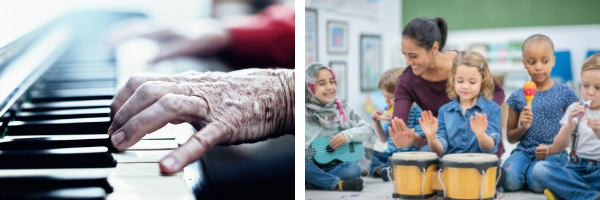
Research reveals that making music really is ‘key’ for our health and well-being
Scientific research results, collated by charity Music for All, have today revealed the fascinating health benefits that learning to play a musical instrument can bring.
Released by Music for All ahead of Learn to Play Day 2019 - a national event on 23rd & 24th March 2019 to encourage everyone in the UK to start making music - the results show the numerous physical and mental health benefits which regularly playing a musical instrument can bring - whatever our age!
The results included:
- Playing an instrument as a child leads to a sharper mind in old age: those who had played an instrument for a decade or longer scored significantly higher on tests to measure memory and other cognitive abilities than those with no musical background.1
- Higher intelligence: Children who received music lessons for one year gained an average of 2.7 IQ points more than a control group of children who did not over the same period, with particularly large increases in verbal ability, spatial ability, processing speed and attention.2
- Participating in making music for older people can result in lower mortality rates3; lessen deterioration in physical health4 and reduce the use of medication.
- Playing the piano exercises the heart as much as a brisk walk5.
- Making music develops your brain - extensive instrumental music training affects the anatomy of the brain with greater grey matter volumes in motor-related areas6 and greater white matter volumes in motor tracts7 with differences emerging after one year of music training8. The thickness of the corpus callosum, which links the two hemispheres of the brain, is found to increase directly with the hours spent practising the piano9.
Paul McManus, CEO at Music for All, said:
“Those who currently play a musical instrument already know the enjoyment it can bring to our lives and how it is an amazing thing that can bring people of all ages and backgrounds together. Collating this research on the health benefits is just another reason why we as a charity believe that everyone should have the opportunity to learn to play.
“It’s clear that the desire to learn to play is there from the public as our research also indicated that, out of those people who have never played, 58% (14.6m) would like to learn to play a musical instrument, and an astonishing 76% of non-players said that they wished they had learnt to play an instrument. That’s why our 2019 Learn to Play Day event is the perfect opportunity for people across the country to not only discover the joys that making music can bring, but also to reap the numerous health benefits that come with it.”
Learn to Play Day 2019 will take place on Saturday 23rd and Sunday 24th March, and will see music shops, teachers, venues and schools throughout the UK partner with leading musical instrument brands to offer thousands of FREE music lessons.
Held in partnership with the Musicians’ Union, the ‘Take It Away’ scheme and Making Music, the Learn to Play Day initiative is backed by some of the nation’s most celebrated music stars including Jools Holland and Jamie Cullum.
Pianist, composer and TV Presenter Jools, who is Music for All’s Patron, said:
“As Patron of the Music for All charity, I’m delighted to lend my support to National Learn to Play Day on March 23rd and 24th. It’s a pleasure to be able to share the joy of music, and this special day allows thousands to get involved as venues all over the country offer music lessons for free.”
Fellow musician Jamie Cullum added: “National Learn to Play Day gives everyone a chance to play an instrument, even if they’ve never played before. This wonderful day introduces thousands to the magic of music making, and often reunites people with a lost passion for playing. Get involved and perhaps discover a skill you thought you didn’t have!"
To find a FREE music lesson near you, simply visit https://musicforall.org.uk/learntoplayday/
Research details and references:
1 [Hanna-Pladdy, 2011] “The Relation Between Instrumental Musical Activity and Cognitive Aging”, Brenda Hanna-Pladdy & Alicia MacKay, Neuropsychology. 2011 May ; 25(3): 378–386. doi:10.1037/a0021895. paper
As noted by Diane Cole: “Playing an instrument as a kid leads to a sharper mind in old age, according to a new study conducted by Brenda Hanna-Pladdy, a clinical neuropsychologist in Emory’s Department of neurology, and her colleagues. The researchers gave 70 people between the ages of 60 and 83 a battery of tests to measure memory and other cognitive abilities. The researchers found that those who had played an instrument for a decade or longer scored significantly higher on the tests than those with no musical background.” (from Diane Cole, "Your Aging Brain Will Be in Better Shape If You've Taken Music Lessons," National Geographic, January 3, 2014”).
2 [Schellenberg , 2004] Schellenberg, E.G.. “Music lessons enhance IQ”, Psychological Science, 15(8), 511-14, 2004.
As noted by Prof. Susan Hallam: “Schellenberg (2004) randomly assigned a large sample of children to four different groups, two of which received music lessons (standard keyboard, Kodaly voice) for a year, the control groups receiving instruction in a non-musical artistic activity (drama) or no lessons. All four groups exhibited increases in IQ as would be expected over the time period but the music groups had reliably larger increases in full scale IQ with an effect size of .35. Children in the control groups had average increases of 4.3 points while the music groups had increases of seven points. On all but two of the 12 subtests the music group had larger increases than control groups. Notably, the music groups had larger increases on the four indexes that measured more specific abilities (verbal ability, spatial ability, processing speed, and attention).” (From [Hallam, 2015]: Susan Hallam, “The Power of Music: A Research Synthesis on the Impact of Actively Making Music on the Intellectual, Social and Personal Development of Children and Young People”, ISBN 1905351313, 9781905351312, 2015)
Participating in making music for older people: As noted by Prof. Susan Hallam [Hallam,2015], ibid., “There also seem to be some general health benefits of participating in making music for older people including lower mortality rates3, a lack of deterioration in physical health4 with fewer visits to the doctor and less use of medication.”
3 [Byrgen,1996] Byrgen, L.O. Konlaan, B.K. & Johansson, S-E. “Attendance at cultural events, reading books or periodicals and making music or singing in a choir as determinants for survival: Swedish interview survey of living conditions”, British Medical Journal, 313, 1577-1580.
[Hyyppa, 2001] Hyppa, M.T. & Maki, J. (2001). “Individual-level relationships between social capital and self-rated health in a bilingual community”, Preventative medicine, 32, 148-155.
[Konlann, 2000] Konlaan, B.B., Bygren, L.O. & Johansson, S-E. (2000). “Visiting the cinema, concerts, museums or art exhibitions as determinant of survival: a Swedish fourteen-year cohort follow-up study”, Scandinavian Journal of Public Health, 28(3), 174-8.
[Johansson, 2001] Johansson, S.E., Konlaan, B.B. & Bygren, L.O. (2001) “Sustaining habits of attending cultural events and maintenance of health: a longitudinal study”, Health Promotion International, 16(3), 229-234
4 [Hillman, 2002], Hillman, S. (2002). “Participatory singing for older people: A perception of benefit”, Health Education, 102(4), 163–71.
[Cohen, 2006], Cohen, G.D., Perlstein, S., Chapline, J., Kelly, J., Firth, K.M., & Simmens, S. (2006). “The impact of professionally conducted cultural programs on the physical health, mental health, and social functioning of older adults”. The Gerontologist, 46(6), 726–34.
[Cohen, 2007]. Cohen, G.D., Perlstein, S., Chapline, J., Kelly, J., Firth, K.M. & Simmens, S. (2007). “The impact of professionally conducted cultural programs on the physical health, mental health and social functioning of older adults – 2–year results”. Journal of Aging, Humanities and the Arts, 1(1), 5–22
5 From [Hallam,2015] ibid. “Playing the piano exercises the heart as much as a brisk walk [Parr, 1985]”
[Parr, 1985] Parr, S.M. (1985). “The effects of graduated exercise at the piano on the pianist’s cardiac output, forearm blood flow, heart rate, and blood pressure”. Dissertation Abstracts International, 46(6), 1436A. (UMI No. AAT85-18673)
6From [Hallam,2015]
[Elbert, 1995] Elbert, T., Pantev, C., Wienbruch, C., Rockstroh, B., & Taub, E. (1995). “Increased cortical representation of the fingers of the left hand in string players”, Science, 270, 305-7.
[Hyde, 2009], Hyde, K.L., Lerch, J., Norton, A., Forgread, M., Winner, E., Evans, A.C. et al. (2009). “Musical training shapes structural brain development”, The Journal of Neuroscience, 29(10), 3019-25.
[Pascual-Leone, 2001] Pascual-Leone, A. (2001). “The brain that plays music and is changed by it”, Annals of the New York Academy of Sciences, 930, 315- 29.
7From [Hallam,2015]
[Bengtsson, 2005] “Extensive piano practicing has regionally specific effects on white matter development” 7.8.05 Sara L Bengtsson, Zoltán Nagy, Stefan Skare, Lea Forsman, Hans Forssberg & Fredrik Ullén Nature Neuroscience volume 8, pages 1148–1150 (2005) https://doi.org/10.1038/nn1516
8From [Hallam,2015]
[Hyde, 2009], ibid.,
[Schlaug, 2005] Schlaug, G. Norton, A., Overy, K. & Winner, E. (2005). “Effects of music training on the child’s brain and cognitive development”, Annals New York Academy of Science, 1060, 219-230.
9 [Bengtsson, 2005] ibid.
National Learn to Play Day partners include the Musicians’ Union, Take it away scheme, and Making Music.

About Us
Music for All
Making music changes lives. In our view, EVERYONE should have the opportunity to learn to play music. Sadly, many people are not fortunate enough to have access to musical instruments or ways to help them to learn and discover. This is where we come in.
• We donate instruments and music tuition to individuals who need our help.
• We make grants available to address the musical needs of community music groups and educational organisations.
• We bring free of charge ‘Learn to Play’ experiences to people of all ages and backgrounds.
• We promote the life-changing benefits of music making
Music for All Ambassadors include:
Jools Holland, Rick Astley, Aled Jones, Howard Jones, Glenn Hughes, Ruth Palmer, Rick Wakeman, Steve Morse, Michael McKell, Michael Paget, Alex Skolnick, John Illsley, Ian Paice, Mike Weatherley, Gordon Giltrap, Al Murray, Kill It Kid, Bill Bruford, Dame Evelyn Glennie, Mike Stevens, Gavin Harrison, Ace and Gareth Malone.
Musicians’ Union
The Musicians' Union represents more than 32,000 professional musicians in the UK and its members who teach music are provided with a range of valuable benefits, including: £10m of Public Liability Insurance, £2,000 of equipment cover, a dedicated Teachers' Section, a biennial Teachers' Conference, teaching contracts, legal services, specialist health care and support materials.
Take it away
Take it away is an Arts Council England initiative which aims to get more children and young people playing music by providing interest-free loans for the purchase of musical instruments. The scheme is open to adults buying a musical instrument for a child under the age of 18, and 18-25 year olds who can apply in their own right.
Take it away is operated by Creative United and is available through a network of instrument retailers across England.
Making Music
Making Music is the UK organisation for amateur music, with over 3,100 community music groups in membership, representing nearly 200,000 individual amateur musicians. We support, connect and champion everyone who makes, performs and presents music on a voluntary basis. The services we provide allow our members – ranging from symphony orchestras to samba bands – to cross the boring things off their ‘to-do’ lists and get on with making music.
Making Music believes that everyone should have the opportunity to engage with music and it is one of our objectives to encourage more and new people to participate in music so that more individuals and communities can experience and enjoy the benefits.
For more information, go to:
www.musicforall.org.uk or www.facebook.com/musicforallcharity
Contacts
Links